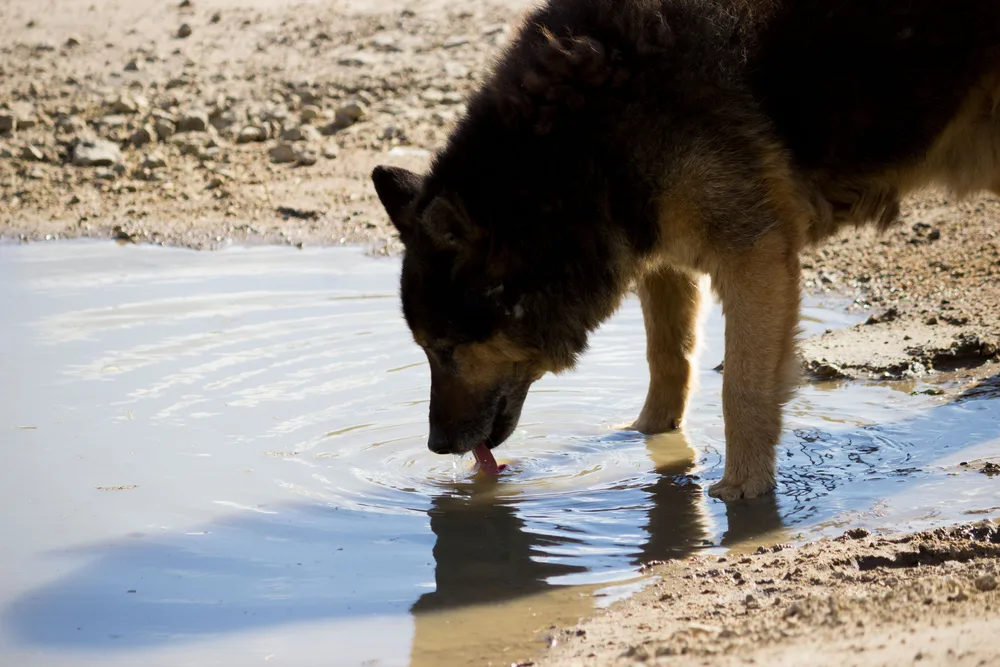Medically Reviewed by Dr. Majid Tanveer, DVM
When it comes to our beloved canine companions, one of the most common – and sometimes frightening – issues they may face is a parasitic infestation by worms. While these parasites can cause significant discomfort and even severe health issues for dogs, quick action and smart prevention strategies can help keep them healthy.
As a lifelong pet owner and professional veterinarian, I understand the importance of staying vigilant for signs of worms in dogs and taking prompt action to diagnose and treat any infestation.
Diagnosing worms in dogs requires a physical exam, lab tests, and sometimes imaging. To prevent reinfection, regularly deworm and clean the pet’s environment; practice good hygiene when caring for them. Treatment involves anthelmintic drugs to kill parasites or other drugs to alter their metabolism. Good hygiene is essential to avoid spreading the infection to other animals or humans.
Let’s look at each of these steps in more detail.
An Overview Of Worms In Dogs
Worms are parasitic organisms that live within the bodies of animals, like dogs, and take advantage of their hosts to sustain themselves.
These parasites primarily reside within a dog’s intestine, feeding on digested food particles and other elements in the digestive system – leading to issues such as diarrhea, vomiting, weight loss or even anemia, malnutrition, and severe cases, death.
Certain worms can breach your dog’s internal organs, such as the lungs, heart, and liver, where they feed off blood and tissue. This can lead to serious harm – even death – if left untreated.
Common Types Of Worms In Dogs

Various worms can infest your dog, each with its life cycle and shape. Knowing and identifying them is essential for successful eradication. The types of worms that can infect dogs vary greatly, from flatworms to roundworms.
A comprehensive understanding of these worms will help you make informed decisions to protect your pup.
There are 5 main types of worms you should watch out for:
- Roundworms
- Hookworms
- Whipworms
- Tapeworms
- Heartworms
Roundworms
Roundworms are white, spaghetti-like parasites that feed on the dog’s intestine contents. They attach to the walls of the intestine using a sucker and their tentacles and can grow up to 4 inches long.
Severe infestations can cause diarrhea, weight loss, bloating, lethargy, and respiratory issues. Roundworms can also be passed from mother to puppy during pregnancy or breastfeeding.
There are two main types of roundworms in dogs:
- Toxocara canis (T. canis) (Found in puppies)
- Toxascaris leonina (commonly seen in adult dogs)
T. canis has also been known to be transmitted to humans, so it is important to seek treatment if the dog exhibits symptoms of an infection.
Tapeworms
Tapeworms are flat, segmented worms that attach themselves to the walls of the intestine using hooks and suckers. They feed on partly digested food in the intestine and may grow up to 4-28 inches long.
Tapeworms can be identified in your dog’s stool, as they look similar to rice grains or sesame seeds. An additional indication is if your pup begins dragging its bottom along the ground—a sign that tapeworm infection has taken hold.
Tapeworms are contracted when pets ingest fleas, lice, and other small animals. Dipylidium caninum is the most common type in the U.S. If your pup has contracted one, scooting may be observed – a surefire indicator of infection.
Hookworms
Hookworms are small, thin worms with curved “hooks” on the front of their heads and may reach up to 8-11mm in length. They attach to the lining of a dog’s intestines and feed on blood. This can lead to anemia, malnutrition, and digestive problems in infected dogs.
Dogs can become infected with hookworms by ingesting larvae from the environment or via milk from an infected mother. Infection is passed through microscopic eggs in feces, which persist in soil for months.
Contamination happens when dogs lick contaminated dirt or paws after contacting infected matter, such as by sniffing feces. Humans, too, can contract hookworms.
Whipworms
Whipworms are 35-45mm long parasites with a whip-like shape. They feed on the mucous lining of the large intestine (cecum and colon), causing inflammation and irritation.
Their eggs pass into feces and remain viable for up to five years until exposed to warm, moist environments.
Heartworms
Heartworms are long, thin parasites measuring up to 12 inches in length – resembling cooked spaghetti. Mosquitos transmit the tiny heartworm larvae, which then travel to the heart and lungs and grow into adult worms.
If left untreated, these parasites can cause severe pulmonary disease, damage to other organs, or even death.
How Do Dogs Get Worms?

There are several ways in which dogs can contract worms, such as contact with other animals and their waste, drinking contaminated water or food, touching soil filled with infected stool particles, and even from the milk of an affected mother.
Let’s examine some of them:
1. Eating Contaminated Food or Feces
Dogs can get worms by eating food or feces that have already been contaminated with the eggs of parasitic worms. This is more likely to occur if the pet has access to hunting grounds, trash cans, and other places where contamination may occur.
Additionally, if another animal in the home is infected with worms, the pet could become infected if they share a food bowl or eat from the same dish.
2. Swallowing an Infected Flea
Fleas can carry tapeworms, parasites that live and feed in the intestines of cats, dogs, and people. If your pet swallows an infected flea while grooming, tapeworms can infect him.
Additionally, fleas will sometimes leave eggs behind on your dog’s skin and fur that can hatch into larvae and cause an infestation if not treated promptly.
3. Drinking From Puddles, Ponds, or Lakes That Contain Larvae
Drinking from ponds, puddles, or lakes that contain larvae can be a source of roundworms, hookworms, and tapeworm infections for dogs.
The microscopic eggs ingested through these contaminated water sources can cause significant health issues. When the larvae hatch in the body, they can lead to further problems.
4. Coming in Contact With Soil-Carrying Parasites
Coming in contact with contaminated soil can transmit worms, like hookworms, whipworms, and roundworms, to our canine pals. These larvae enter the body when your pup comes into contact with infected feces or urine from other animals, causing severe issues.
5. Ingesting an Animal Carrying Worms (Like Mice)
Dogs can inadvertently intake worms when hunting and consuming wild creatures like mice. Exposure to the environment’s microbes intensifies this danger since these animals may host parasites.
Consequently, ingesting them causes a heightened risk of acquiring an infection related to their laborious activities.
6. Mother-to-Puppy Transmission During Pregnancy or Nursing
Mothers can transmit parasites to their puppies before or after birth. Infection during pregnancy occurs through the placenta; post-birth, it is done via milk.
Mother-to-puppy transmission of worms is not as standard as other sources, so monitoring mothers and puppies for signs of an infestation is essential.
7. Through a Mosquito Bite
Mosquito bites can be dangerous for dogs; they may transmit worms such as heartworms and hookworms into their bloodstream.
Use preventive measures against mosquito bites and heartworm preventatives to protect your pet. Don’t let them become ill due to an infected worm!
Symptoms of Worms in Dogs

Dog owners should be mindful of potential signs their canine companion suffers from intestinal parasites. Some of the most common signs of a worm infestation include the following:
- Diarrhea
- Vomiting
- Abdominal pain
- Weight loss
- Poor coat condition
- Scooting or rubbing their bottom on the ground
- Bloated abdomen
- Intestinal blockage
- Blood in the stool (either bright red or darker purple)
- Pneumonia and coughing
- Anemia (pale gums)
- Difficulty breathing
- Lethargy
- Dehydration
- Increased appetite but lack of weight gain
Taking action immediately is crucial if your dog displays any of these symptoms. However, depending on the type of parasite found in your pet, other signs associated with a worm infestation may also occur. Don’t hesitate – act now!
Diagnosis of Worms in Dogs
Vigilance is key in identifying a potential worm infestation in pets. Pet owners must routinely inspect their pet’s health and be mindful of the tell-tale signs associated with such an attack.
To diagnose dog worms, veterinarians typically rely on several methods, including physical examination, laboratory tests, and imaging techniques.
Physical Examination
During the physical exam, the veterinarian will seek out any visible signs or markers of infestation, such as worms and larvae in either vomit or fecal matter.
Furthermore, they may palpate the stomach area to feel for any unusual masses or enlargements that could signal a parasitic infection.
Diagnostic Testing (Stool Sample, Blood Tests, Ultrasound)
- To diagnose worms in dogs, a veterinarian may perform several lab tests, including the fecal flotation test, which examines feces for worm eggs or larvae, and the serum antibody test to identify antibodies present that could signify an active infestation.
- Imaging studies, such as x-rays or ultrasounds, may also detect modifications in the canine’s internal organs due to a parasitic infestation.
Treatment of Worms in Dogs
Treatment for worms in dogs should be done under the supervision of a veterinarian. It may include regular deworming, administering antiparasitic medications, or using parasite control products to eliminate any remaining eggs.
Regular fecal exams can help monitor infection and detect reinfection before it becomes severe. These are the drugs that are used chiefly:
| Worms | Drug of Choice |
| Roundworms | Fenbendazole, Milbemycin, Pyrantel |
| Tapeworms | Albendazole, Nitazoxanide, Praziquantel |
| Hookworms | Mebendazole, Albendazole |
| Whipworms | Fenbendazole, Febantel, Moxidectin, Milbemycin, Oxantel |
| Heartworms | Melarsomine dihydrochloride |
Home Remedies Of Dog Worms
With so many home remedies, finding the most effective way to rid your dog of worms is essential:
- Apple cider vinegar can be added to your pet’s water bowl, which has been known to help eliminate pinworms and roundworms.
- Not only are pumpkin seeds an ideal treat for your pup, but they also offer a boost of fiber that can help increase their digestion.
- Finally, adding a few drops of food-grade diatomaceous earth to your pet’s food can help rid them of internal parasites.
While these home remedies may not eliminate all canine worms, they can help prevent and control them.
Prevention Strategies for Worms in Dogs
- Provide regular deworming treatments with medication prescribed by a veterinarian.
- Remove feces from the yard and dispose of them properly.
- Keep pets away from areas where infected animals may have been.
- Discourage wild animals from entering your yard.
- Feed pets only high-quality food, and avoid leaving pet food out for extended periods.
- Clean up after your dog if he goes to a park or other public spaces.
- Practice good hygiene when handling pets, especially during grooming sessions.
- Keep your pet’s environment clean by washing bedding and toys regularly.
- Take steps to prevent fleas, ticks, and other parasites on your pet.
- Have your veterinary clinic perform routine fecal exams to check for worms or other parasites.
Pet Care Tip: Look at this amazing video on how to craft an easy, homemade dewormer for your pup right in the comfort of your home!
Frequently Asked Questions
How Long Does It Take For The Dewormer To Work?
The potency of dewormers is contingent on the magnitude of the infection. To eliminate the parasites, a few treatments may be necessary. Generally, an entire month-long course must be completed for stronger effects against roundworms. Every larvae and egg must be removed from your pup’s system to ensure total elimination.
What Happens After Deworming
After a puppy has been dewormed, it’s common to expel deceased worms in its stool. Sometimes the parasites may even appear to be moving before they die off, and usually, you will notice signs of diarrhea following the treatment.
What Are The Side Effects Of Puppy Wormer?
While most puppies will not experience any adverse reactions to a wormer, some may have an upset stomach or diarrhea. If these symptoms occur after giving your puppy a wormer, you must stop giving the medication and call your veterinarian for further instructions.
